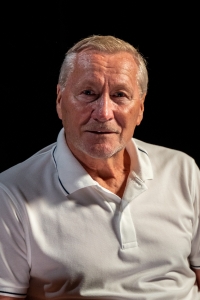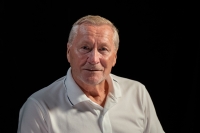„I had such a meteoric rise that at sixteen I came to the first training session, yes...and at seventeen I was already playing for men.“

Stáhnout obrázek
Ján Pivarník, a former Slovak football player and football coach, was born on November 13, 1947, in the mountainous region of the country, in the village Cejkov. Father, Ján Pivarník, married to Cejkov when he was over 27 years old and became a skilled carpenter. Mother Anna, unmarried Šemigová, worked together with her mother in a shared household. Five children were born in the family, while Ján was the youngest. In 1954, Ján started attending a local nine-year elementary school, where the status of a spark or a pioneer was not carried much, since it was not a strongly communist village. Since there was only one football team in Cejkov, and that was for men, Ján sought his fortune in Trebišov. He was the part of Slavoj Trebišov from 1965 to 1966, and it was a very fast progression, as he went from teenagers to men in less than a year. In addition to representing the Trebišov football team, he also became part of the under-18 national team. Good results were followed by a transfer. The football club VSS Košice suggested to Ján that if he transferred to them, he would be given the opportunity to study at a secondary industrial school, which was definitely a much better choice than the school he was attending at the time, that is, a school specializing in auto mechanics. He worked at VSS Košice since 1966 and was also part of the Czechoslovak national team. As a representative, he also experienced the World Championship in 1970 in Mexico, which did not turn out as expected, but participating was already a great success. After an unsuccessful transfer to Sparta Prague, the transfer to Slovan took place in 1972. It was also because of his future wife, actress Jarmila Koleničová, who at that time worked in the Nová scéna theater in Bratislava. Ján became the best soccer player in Czechoslovakia between 1973 and 1975. In 1976, he was part of the team that represented Czechoslovakia at the European Championship, and won the championship. Ján, even though he was a well-known and successful football player, definitely did not stop at graduating from secondary industrial school. He started attending the Faculty of Law in Košice, where he completed the first two years. He spent the remaining years in Bratislava due to his transfer to Slovan. He put down the Slovan jersey in 1978 and, after a few ups and downs, he joined the mandatory military service, which lasted ten months. Between 1978 and 1979, he became part of the football club Dukla Banská Bystrica. In 1979, Ján was still active in the Austrian football team SC Neusiedl am See, but only for two years. At the age of 35, thanks to a meeting with the Kuwaitis in Piešťany, who were urgently looking for a good coach, he got the opportunity to travel to the countries of the Middle East. He worked as a coach in Kuwait, Saudi Arabia, Qatar, Oman and the United Arab Emirates for over twenty years.

